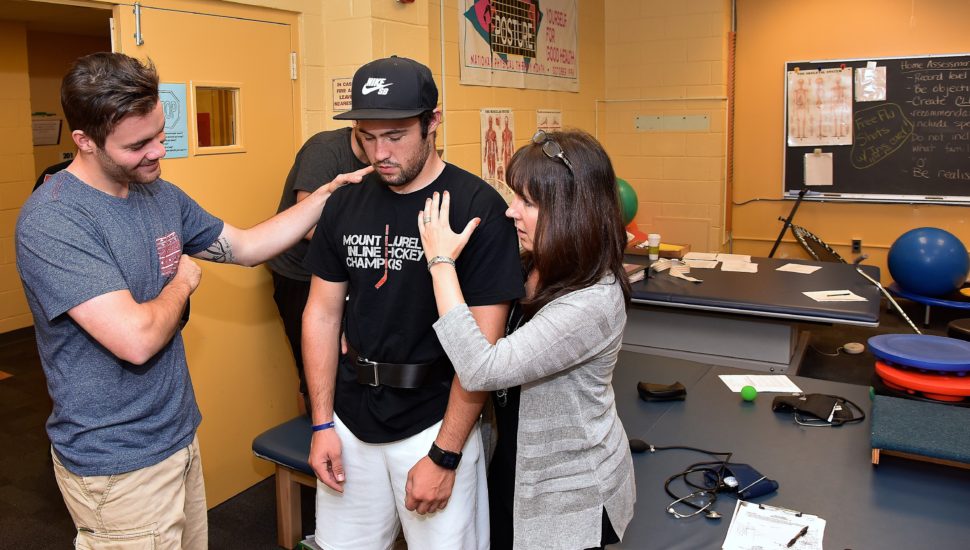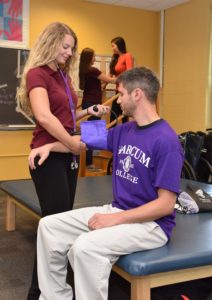The Value of the Physical Therapist Assistant Degree Program: Examining the Return on Investment

 By Dr. Jacqueline Klaczak Kopack, PT
By Dr. Jacqueline Klaczak Kopack, PT
Which degree is more valuable? An associate’s degree in Physical Therapist Assisting (PTA) or a doctoral degree in Physical Therapy (P.T.)? Both occupations are in-demand as the number of Baby Boomers continues to rise. Many Boomers are looking for support in maintaining health to remain active, while others seek physical therapy for chronic conditions that can cause mobility issues, such as cardiac disease and arthritis. Both career paths offer hands-on active careers, treating people of all ages, and both are excellent choices for those with a sincere desire to help others.
However, for many students, the PTA degree may be the smarter choice.
First, a PTA degree is a more economical investment of time and money. The average cost for a PTA degree is between $20,000 and $40,000. The average cost of a P.T. degree is $182,000 (estimated at $100,000 for a bachelor’s and $82,000 for the required DPT).
After only two years of college, after graduating from an accredited program, a PTA can enter the work force. Those pursuing the P.T. degree will complete six or seven years of education before they can get started in the profession. While the P.T. student is still in school, the PTA graduate can be gaining valuable work experience and earning a good salary.
 The average salary for a PTA in the U.S. is $58,720. The average salary for a Physical Therapist is $87,720. And while a P.T.’s median salary is about $29,000 greater than that of a PTA, earning that P.T. degree may have cost upwards of $100,000 more.
The average salary for a PTA in the U.S. is $58,720. The average salary for a Physical Therapist is $87,720. And while a P.T.’s median salary is about $29,000 greater than that of a PTA, earning that P.T. degree may have cost upwards of $100,000 more.
A student earning a PTA degree is eligible for federal and state aid. A student planning to become a PT will quality for the same level of aid when completing the required bachelor’s degree program. However, as these students continue on and enter graduate school to earn the DPT (the required terminal degree to become a practicing Physical Therapist), most of those graduate courses will likely not be aid-eligible. In her annual address to the profession, the APTA President stated, “The cost of a DPT degree is an almost insurmountable barrier that challenges the ability of recent graduates to achieve basic financial stability.”
While both are rigorous allied health programs, PTA programs are often a good fit for solid 3.0 (B) students while many P.T. programs may require a significantly higher GPA, and many require applicants to complete the GRE prior to applying.
Harcum College offers two PTA programs — full-time day and part-time evenings — both accredited by CAPTE.
The PTA degree at Harcum College is ideal for working adults. Part-time evening studies can be combined with a day job until clinical rotations are completed (most occur in the final semester). Applications are now being accepted for the part-time evening program beginning in January 2020.
Besides flexibility, the PTA program offers a small professor-student ratio for increased opportunities for hands-on learning; a 2017 Licensure Pass Rate of 100% and 2018 of 97.6% (consistent annual pass rate greater than national average); and 100% employment within six months of graduation.
Prospective PTA students, especially those interested in starting in January 2020, should attend an Open House on Saturday, Nov. 9. Registration is requested. Personal visits can be accommodated by calling us at 610-526-6050 or emailing enroll@harcum.edu.
____________________
 Jacqueline Klaczak Kopack, PT, DPT, is the Physical Therapist Assistant (PTA) Program Director at Harcum College. She is a recipient of the Philip Klein Memorial Award and the Lindback Award for Excellence in Teaching.
Jacqueline Klaczak Kopack, PT, DPT, is the Physical Therapist Assistant (PTA) Program Director at Harcum College. She is a recipient of the Philip Klein Memorial Award and the Lindback Award for Excellence in Teaching.
.
.
[uam_ad id=”80503″]
.
[uam_ad id=”80502″]
Connect With Your Community
Subscribe to stay informed!
"*" indicates required fields
















![95000-1023_ACJ_BannerAd[1]](https://vista.today/wp-content/uploads/2023/03/95000-1023_ACJ_BannerAd1.jpg)































